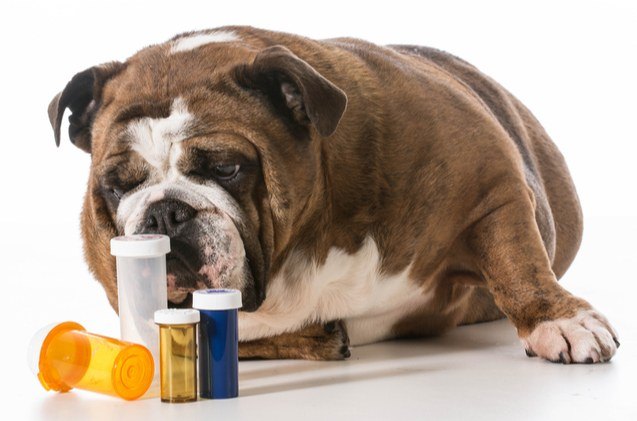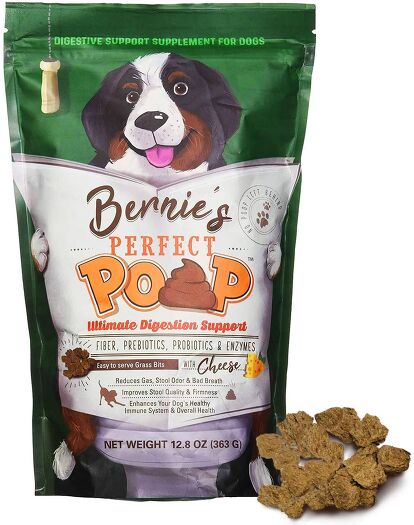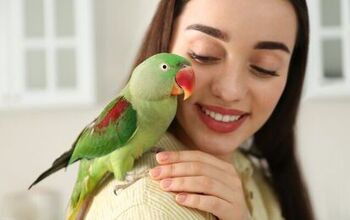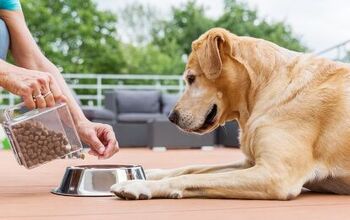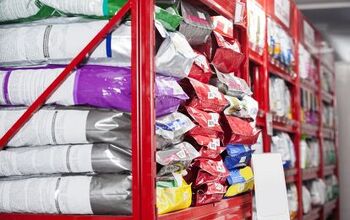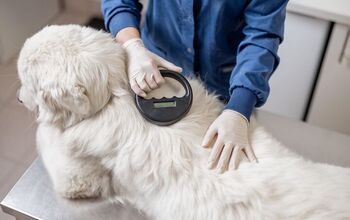Best Dog Probiotics for Better Digestion

Dog probiotics make sure your pet’s gut is healthy and balanced and their overall immune system properly supported. Read on to find out what are the benefits of probiotics for dogs–and which one to choose for your pet!
There’s no secret that our gut plays an important role in our overall being: the good bacteria in the digestive system can help with a myriad of health issues and boost our overall immune system. But did you know that the same goes for dogs? Not unlike us, our four-legged besties can also suffer from a range of digestive and other health issues that can be solved or reduced by maintaining healthy gut flora. By maintaining or increasing the count of good bacteria in your pet’s digestive system, you could both prevent and treat different conditions- but you need to know which type of dog probiotics will be best suited for your pet’s needs before you introduce a new product to their routine.
You see, even though the principle behind probiotics is the same for dogs and humans, the type of probiotics are different. Dogs need their own, specially formulated canine probiotics and can’t use those meant for human use – so it will take a bit of research before you know what type of dog probiotics you should get for your pet, regardless of your own previous experience with human probiotics. From dosage to different strains, there is plenty to look for in dog probiotics before you make the final decision. When you get it right, you can rest assured that not only the probiotics are safe for your pet but effective, as well. Of course, a good dog probiotic needs to work alongside a proper and balanced dog diet. You can’t neglect your pet’s food and expect a probiotic to fix the resulting issues. Don’t forget that paying good attention to how you feed your pupper is a good way to solve many issues.
To make sure your pet’s upset tummy is a thing of the past and that their immune system is supported, we’ve rounded up the best dog probiotics that pet parents swear by. There are different reasons why you would give your dog probiotics and various issues you can treat and prevent with the right type, so make sure to read our guide on benefits and features to look for in probiotics for dogs before you pick out something for your dog.
Editor’s Choice: Bernie’s Perfect Poop
As the name reveals, this potent dog probiotic will make your pet’s stool optimal–a result of much improved digestive health. The formula combines probiotics and prebiotics with digestive enzymes and fibers, ensuring that your pet’s gut flora gets everything it needs to thrive. Natural, non-GMO, and made in the USA, this dog probiotic is unique in its form: the tasty solid grass bits can be served as a treat or mixed in with your pet’s food as a topper. There are two available flavors, cheddar cheese and chicken. Even picky pooches love this one!
Runner Up: PetVitalityPRO Probiotics for Dogs
In order to ensure your pet is really reaping the benefits from that good bacteria in their soft chews, PetVitalityPRO contains four billion colony forming units per serving. To boot, these duck-flavored chewable probiotics are enriched with digestive enzymes, antioxidants, and a blend of vitamins and minerals to offer your pet a full specter of benefits in addition to balancing out their gut health. Ingredients such as papaya, yeast extract, and green superfoods are bound to have a great effect on your pet’s skin, coat, and overall health. PetVitalityPRO Probiotics for Dogs are made in the USA and are meant for adult dogs of all sizes.
Budget Choice: Nutri-Vet Pre and Probiotic Soft Chews
Veterinarian-formulated, these cheese and liver flavored soft chews combine good bacteria with prebiotic extracts that will feed it and ensure it thrives in your pet’s gut. The combination of pre and probiotics, as well as a high CFU count make this supplement ideal for dogs that have digestive or health issues that require a potent probiotic to solve them–because Nutri-Vet’s soft chews will deliver. With a CFU count of one billion per two soft chews and a combo of Lactobacillus acidophilus, Bifidobacterium bifidum, and Enterococcus thermophilus this probiotic offers benefits for dogs of all sizes and ages.
Purina Pro Plan Veterinary Diets FortiFlora Probiotic
If your pet refuses chewable supplements and can’t be tricked into swallowing a tablet or a capsule even if it’s hidden inside a piece of bacon, powder form of this probiotic will make it perfect solution–just mix it in their food, wet or dry, and they’ll gobble it up without being wiser for it. And it’s suitable for puppies and adults both! Purina’s FortiFlora probiotic is a potent blend of the probiotic strain Enterococcus faecium SF68 with a range of immune-supporting ingredients such as antioxidant vitamins E, C and beta-carotene for best results. The CFU count is three billion colony forming units per sachet.
NUSENTIA Probiotic Miracle Dog Probiotics for Dogs
Suitable for cats and dogs, young and old, big and small- NUSENTIA has benefits for every pet. The secret is in the blend of six probiotic species into one supplement: Bifidobacterium animalis lactis, Lactobacillus acidophilus, Lactobacillus rhamnosus, Lactobacillus salivarius, Lactobacillus plantarum, and Lactobacillus reuteri.The CFU count is circa one billion units per scoop so the overall count will depend on your pet’s size (which dictates the number of scoops they require). With no byproducts, fillers, or allergens, this probiotic powder is great for sensitive pooches.
Drs. Foster and Smith Probiotic Soft Chews with Prebiotics
The formula of this budget-friendly supplement includes everything you’d want in a probiotic: there are 8 different strains of good bacteria (including Lactobacillus acidophilus and GanedenBC30™), prebiotic fructooligosaccharide that feeds them and ensures they multiply in your pet’s digestive system, and it delivers circa five billion colony forming units per serving. And all of that is packed into cheese flavored treats that will entice your pet in no time! Drs. Foster and Smith Probiotic Soft Chews with Prebiotics are suitable for all ages and for dogs and cats both.
VetriScience Laboratories – Vetri Mega Probiotic
Ideal for dogs prone to allergies and those that have a sensitive tummy, this probiotic relies on beneficial bacteria from non-dairy sources and contains no fillers or harmful ingredients that could trigger your pet’s reaction. The combination of eight different bacteria strains and a prebiotic in the form of fructooligosaccharide ensure that the benefits are readily available for every pooch that uses these supplements- young or old. The CFU count per capsule is 7.5 billion, which is more than enough to help your pet’s digestion and boost their immune system in no time.
Zesty Paws Probiotic Bites
We all know that a bit of pumpkin can help soothe a dog’s tummy, so it’s not surprising that a probiotic enriched by it has a particularly potent effect. These chews are also pumpkin-flavored so they’ll taste yummy too! The combination of six bacteria strains with natural ingredients and prebiotics makes this supplement ideal for treating indigestion, gassiness, and diarrhea. The colony forming unit count is between three and nine billion CFUs per serving–the exact number depends on your pet’s size.
ZuvaPet Probiotic for Dogs with Natural Digestive Enzymes
If all other modes of delivery seem to be too much of a hassle with your picky and stubborn pooch, it’s highly likely that sneaking in a few drops in their food will be the best way into tricking them to get their supplement. The custom formula of probiotics, prebiotics, and natural digestive enzymes contains a whopping 20 different strains of beneficial microorganisms that will target your dog’s symptoms and promote better digestive health. The CFU count of this liquid probiotic is five billion units per serving which is just about right for most dogs regardless of their age and size.
Tomlyn Pre & Probiotic Powder for Dogs
Flavorless and water soluble, this probiotic powder will fool even the smartest pooch- you can sneak this into anything from kibble to a spoonful of yogurt and your doggo won’t be able to tell. It’s really a blessing when you have a picky eater on your hands! The combination of five different bacteria strains includes Enterococcus faecium, Lactobacillus acidophilus and Bifidobacterium breve and delivers a potent 8 billion colony forming units per serving. To boot, this powdered supplement also includes prebiotic fructooligosaccharide to boost the effectiveness of the healthy bacteria. Tomlyn Pre & Probiotic Powder is suitable for all dogs.
Dr. Mercola Complete Probiotics for Pets
This dog probiotic contains 14 different strains of good bacteria which together deliver around 38 billion colony forming units per serving–more than most other probiotics for dogs on the market. Needless to say, if your pet needs something more potent to treat his digestive issues, Dr. Mercola Complete Probiotics for Pets have the formula for it. This scoopable powder probiotic is suitable for dogs of all ages and sizes–it can even be given to cats.
Bil-Jac® BreakThru Biotics Probiotic Dog Food Spray
Another unique delivery method on our list, this probiotic spray for dogs goes above and beyond to make sure your pooch doesn’t realize he’s on supplements. If you have a really finicky dog that turns his nose up if he sees a tablet or sniffs out the mixed in powdered formula, this spray will be heaven-sent. Just spritz some on your dog’s food (the spray is chicken-flavored) and he’ll be none the wiser while the 12 strains of natural probiotics work to improve his digestive health. Each ml contains over a million colony-forming units.
Proviable DC Probiotics
This pet probiotic can be used on both cats and dogs- ideal if you live in a multi-pet household. The set includes a digestive supplement in the form of a paste that’s really easy to administer and contains 0.5 billion CFUs per gram- a perfect dose for most doggos. To boot, it also contains sprinkle capsules meant to be used to treat digestive issues such as loose stool: each pill has over 5 billion CFUs and is guaranteed to help soothe your pet’s upset tummy and bring back the balance to your pet’s gut. Together, this set of dog probiotics is ideal for both preventive and treatment- you get two for the price of one.
The Honest Kitchen Perfect Form Herbal Digestive Dog Supplement
Never underestimate the power of natural remedies! This dog digestive supplement relies on the beneficial effect of herbs to support proper gastrointestinal and bowel health. Made with minimally processed dehydrated whole food, human-grade ingredients, this supplement is mixed with water to create a gel you’ll serve to your pet twice a day. The combination of foods that are naturally beneficial for canine gut health includes papaya leaf, plantain, slippery elm, organic pumpkin seed, and fennel.
VAN BEEK Synacore Digestive Support for Dogs
This dog probiotic brings together all the important GI-boosting substances to create a formula that will improve your pet’s digestive health and support it in the long run. The combination of probiotics, prebiotics, dog digestive enzymes, and vitamins will help pooches with all kinds of digestive issues. And since this convenient dog probiotic comes in powder stick packs, it’s both easy to dose and to mask in your pet’s regular meals: just sprinkle over kibble or mix in wet food.
Does your pet need dog probiotics?
Even though no one can dispute the overall benefits of dog probiotics, not all canines require probiotic supplements to have a healthy, well-balanced gut flora. Most pooches are blessed enough to have plenty enough of good bacteria in their digestive system without help from the side, but many have a range of issues that could signal that probiotics should be introduced. So how do you know if your dog needs probiotics? Here are some common reasons that could indicate that your dog requires probiotics:
Irritable bowel or intestinal inflammation
The main benefit of dog probiotics is that they improve digestion and balance out the gut microbe- so it is clear why these supplements are essential in treating dogs with irritable bowel or intestinal inflammation. By boosting the number of good bacteria in your pet’s stomach, dog probiotics support proper digestion. Your vet will tell you how to dose the probiotics and what to combine them with for a successful treatment, but a good rule of thumb is to make sure your pet is on a healthy diet in addition to the supplements.
Gassiness
Are stinky dog farts the bane of your existence? Occasional gassines is to be expected, especially if your pet is a greedy eater, but if it is a regular occurrence, probiotics for dogs might help your furry fartist (and your nose, by extension). Probiotics settle upset tummies by balancing out the gut flora and as a result, bloating and passing gas will be a thing of the past for your pooch.
Bad breath
OK, so you might not be a victim of smelly dog farts, but how about your pet’s bad breath? You might be vigorous with your pooch’s dental hygiene with regular teeth brushing, dental treats, and chewable toys, but your pet’s breath constantly stinks. The problem might be in their gut- and the solution in the right type of dog probiotics. One of the many “side effects” of probiotics is that they can improve the odor of your pet’s breath, given that the cause of the stinkiness was digestion-related and not a result of poor oral health.
Diarrhea or constipation
Yes, dog probiotics work for diarrhea and constipation both, no matter how contradicting it sounds. The reason is that probiotic supplements for dogs strive to maintain balance within the digestive system and ensure that your dog’s digestion is optimal–including the stool. The good bacteria can turn runny stool into perfect poop and make sure your dog has regular bowel movement.
Allergies
Even though there are not enough studies to back it up, many pet owners swear that their dog’s allergies have gotten better after they started supplementing probiotics. The most probable reason for this is that the regular use of probiotic can boost your pet’s immune system, and as a result, make it easier for their body to fight back- so to speak.
Benefits of dog probiotics
Probiotics for pets help promote better digestion and boost your dog’s immune system, working towards improving their overall health in the process. Needless to say, many dogs can reap the benefits from such supplements, even when they don’t have issues that require the use of dog probiotics. If you are wondering what dog probiotics can do for your pet, here are some of the benefits you can expect to see:
Resolution of GI issues such as constipation or diarrhea, as well as improved digestion
If you notice that your pooch has some gastrointestinal issues such as diarrhea or problems doing the number two, you can act on it early on: try some probiotics and see if the results become better. After just a short while, probiotics can help your pet to return to normal stool.
Reduce bloating and gas and help manage symptoms of inflammatory bowel syndrome in dogs
Is your furry friend a gassy chap? Food doesn’t sit right with them? Bloating and gas happen often with certain breeds, and probiotics can greatly alleviate these issues by helping and promoting healthy digestion.
Shinier coat and healthier skin through boosting vitamin absorption and biotin production
In a combination with a good and healthy diet, dog probiotics can boost the production of biotin and enhance the absorption of vitamins by the organism. This means that the benefits of healthy food are taken to a whole new level with the addition of probiotics and a healthier gut flora.
Support immune system for better overall health
Your pet’s immune system can falter for a variety of reasons. Take preemptive action and boost it with use of probiotics. This is some smart thinking in advance: keep health issues at bay and give yourself some peace of mind.
Minimize allergy issues
Certain dog breeds can be really prone to those pesky allergies, especially during the warmer months of the year. First step to take is, of course, a balanced diet with as little artificial ingredients as possible. The next step is use of probiotics, which can minimize allergy issues and give a boost to the system so it can deal with it much better.
Potentially help prevent colon cancer
Colon cancer does not appear all that often, but it is still a possible threat for every dog. Usually, such illnesses can appear from years of improper diet. But if you take that into consideration and add probiotics to the mix, you can help lay out a healthy and sturdy foundation in your pet’s immune system – which in turn will keep colon cancer at bay.
What to look for in probiotics for dogs
Regardless of the fact that all dog probiotics have the same basic function which is to aid digestion and support a dog’s immune system, not all probiotics for dogs are made alike. From different strains of good bacteria to different form of delivery, there are some factors to consider before you buy.
Types of dog probiotics
Different strains of good bacteria in probiotics can target different specific issues: knowing what strain your pet needs will make the therapy specific and much more effective. However, most combine different strains into one product to deliver a well-rounded product that will benefit most pooches with equal potency. The two species of bacteria that are commonly found in dog probiotics are Bifidobacterium and Lactobacillus. The strains that are proven to be the most powerful for canines include Bifidobacterium animalis, Bifidobacterium bifidum, Lactobacillus acidophilus, Lactobacillus casei, Lactobacillus plantarum and Enterococcus faecium. And when it comes to good bacteria, more is more–so you want probiotics that contain as much as strains and with a CFU count (more on that below) in the billions.
CFU count
CFU means colony formed units and, in a nutshell, it signifies the number of good bacteria in each serving. And when it comes to how many good bacteria is too many, the answer is- you can’t go overboard. The more bacteria (and strains of ‘em) the better, as it will ensure effectiveness–and help speed up the process. A good number is around five to 10 billion CFU or more if you need a probiotic that packs a punch, but that is per serving and not per bottle. More often than not, manufacturers will advertise the CFU count per bottle or package, so the numbers look higher than they are. Be sure to double-check before buying! You can also start with a regular, mid-range probiotic and observe the results. If digestion or poop issues persist, try a brand with more CFU.
Ease of administration
Luckily for pet parents, dog probiotics come in different forms, so administration shouldn’t be an issue. You can go for tablets that can be mixed in their meal or served in a pill pocket, chewables that taste like a treat, powders (flavored or not) that are easily masked in wet food, or oral syringes that make administration fast and easy- just “shoot out” the paste in your pet’s mouth and that’s it. Still, if you are dealing with a super tricky and smart pooch, they might shun tablets and recognize when they are mixed in with the food. Luckily, the paste and powder versions are an ideal substitute.
Food for healthy bacteria: don’t forget the prebiotics
An important thing to consider when giving your dog probiotics is that the supplementation won’t be as effective unless you “boost” it with prebiotics. Prebiotics are compounds in certain foods that “feed” the good bacteria in probiotics and encourage their multiplying and improve their effectiveness. Here are some of the foods you should be introducing to your pet’s diet while they are on probiotics:
- Green leafy veggies such as kale, chard, lettuce etc.
- Organic yogurt
- Kefir
- Bananas
- Apples
- Pumpkin
- Sweet potato
- Raw organic garlic (but only in minimal, allowed amounts–it’s best being careful with dosage when giving garlic to dogs)
Alternatively, you can opt with prebiotic supplements or a probiotic and prebiotic supplement combo, but it’s always best to strive for a well-balanced, healthy diet in addition to the supplements. Of course, it goes without saying that you should never fully rely on dog probiotics to solve every problem you observe. Sometimes, there is an underlying issue that needs professional veterinary attention. Also, you want to first establish a healthy and balanced diet for your pupper – in the end, good health starts with a thriving gut. Probiotics can only benefit it even more.
We are committed to finding, researching, and recommending the best products. We earn commissions from purchases you make using the retail links in our product reviews. Learn more about how this works.

A proud mama to seven dogs and ten cats, Angela spends her days writing for her fellow pet parents and pampering her furballs, all of whom are rescues. When she's not gushing over her adorable cats or playing with her dogs, she can be found curled up with a good fantasy book.
More by Angela Vuckovic



